John Janaro's Blog, page 295
June 18, 2013
Slowing Down For Awhile (Trying Anyway)
 Sorry. I'm slowing down the blog and just about everything else these days. I'm having some "red flag" symptoms (ouch! ouch! ouch! ouch! aaaacckk! clunk!) so I'm taking some weight off my feet and off my brain. I hope this is temporary. Please pray for the sick.
Sorry. I'm slowing down the blog and just about everything else these days. I'm having some "red flag" symptoms (ouch! ouch! ouch! ouch! aaaacckk! clunk!) so I'm taking some weight off my feet and off my brain. I hope this is temporary. Please pray for the sick.
Published on June 18, 2013 10:30
June 17, 2013
Agnese Janaro's Confirmation: A Father's Thoughts
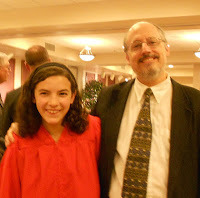 Father and daughter at the receptionAgnese Janaro received the sacrament of Confirmation this past weekend. She took the name of St. Isaac Jogues (yes, you can pick a saint of either gender). She had read about him and was (no doubt) deeply impressed by his extraordinary Christian witness (who wouldn't be?), but she hasn't said much about why she chose him in particular. I am happy to respect her discretion.
Father and daughter at the receptionAgnese Janaro received the sacrament of Confirmation this past weekend. She took the name of St. Isaac Jogues (yes, you can pick a saint of either gender). She had read about him and was (no doubt) deeply impressed by his extraordinary Christian witness (who wouldn't be?), but she hasn't said much about why she chose him in particular. I am happy to respect her discretion.I tease my poor girl too much. I want her to be confident that she can grow and have aspirations and try new things without thinking that her father is going to find out and start joking around and making her feel silly. Or that he's going to write about her adventures on his BLOG!
We love her so very much!
A little teasing, now and then, won't hurt her of course. She has her own sense of humor, and a heart inspired by courageous deeds. She is a marvel, and God is shaping her heart in His mysterious ways.
I spoke with her briefly the day before, because I wanted to express simply how much it meant to me in my own life to meet Jesus, to discover Him as a real Person, and to live a relationship with Him with all my desire. This is what matters in my life.
So I said a few awkward words. But more important than any words: does she see this in me, in the way I live the circumstances of my life as her mother's husband, as her father? Does she see this in the way I struggle every day with my disability and the limits it imposes on me; or in my struggles to overcome my sense of frustration and failure, and to battle against my own forgetfulness and the weight of selfishness and my countless petty faults? Does she see that (even with all my goofiness) He is the One who enables me to love her, and is the reason why I love her so much? Do I help her to see, not just in words but in real life, that He is real and He is here and that He loves us all? Do I help her to see that she can trust in His love?
I hope and pray that my life bears some witness to the real Jesus. The most important thing, of course, is that He is already here, with us, with her, already shaping her heart in His mysterious ways. This is the depths of her "self," this relationship that does not belong to me. God is her Father. Jesus and the Holy Spirit open her heart to this love.
But I have been given my own part to play, and I must carry it out in whatever circumstances. I must have the faith that gives me the confidence to get up again and again whenever I fail, and to thus witness through my life that His mercy sustains me.
His mercy is always worthy of trust.
Published on June 17, 2013 20:00
June 14, 2013
No Answer Except Love
 We have to admit that life opens up a lot of questions. A living relationship with Jesus, however, encompasses and carries us even in our struggles with questions and problems.
We have to admit that life opens up a lot of questions. A living relationship with Jesus, however, encompasses and carries us even in our struggles with questions and problems.There are times when my own questions are expressions of resistance; they come from the places in my soul that I have not yet opened to God. They are attempts to hide from the recognition of my own sins, because I forget that I have been made to receive the mercy of God, that He wants to fill my emptiness with His love. Or else I am too proud to admit that I am empty, and I deprive myself of the beauty of experiencing forgiveness. For what?
There are other kinds of questions, genuine and mysterious ones. I have frustration when I feel like I perceive some truth, but I don't know how to communicate with others. I feel misunderstood by others, or I am restless with the "in a glass, dark" obscurity that always accompanies faith, and that seems to grow deeper even as the experience of faith increases. I have a faith that seeks understanding, and this is a gift, but how can I acknowledge it for what it is while also bearing its limits?
And then there are the daily, very ordinary trials of trying to live with other people, especially my brothers and sisters in Christ. There is nothing romantic about Christian community. Its human, its hard, its a clash of stubborn souls with so many wounds that we hide from ourselves and one another. Trying to understand these issues only aggravates them. My mind weaves pretexts for opposition, ideologies for self defense or partisanship, or shallow evasions.
What is the point of these questions? What does Jesus want?
Sometimes Jesus wants to change my heart and sometimes He is asking me to recognize and embrace Him in His suffering, precisely in those issues, in the frailty of myself and others and our sins - this brokenness that He enters and endures, and that has no "answer" except Love.
I believe that Love happens right there. Love happens wherever the pain is, or the incomprehension, or the weakness, the resistance, the secret pride.
Love happens also in the awful burden of the gift of insight, and the patience required to understand what it means, to be humbled by the utter smallness of anything I think I understand, to learn from others who have other gifts, and to discover how to share what I have been given.
I know these difficulties are really for me -- they are places of God's love for me -- because I encounter the Cross in them. The Crucified One is there for me, and of course I hide from Him 99.9999% of the time.
I'm proud. And I'm afraid of the suffering.
But He calls me to let go of my pride, and to acknowledge my sins and experience my need for Him.
"O Lord, I am proud. Make me humble! Give me the grace to be humble and poor, with a heart open to receive Your love and be changed by You!"He calls me to be not afraid, to trust in Him, to stay with Him and suffer, and that especially is how He wants to change me, and how He has (I hope) already begun to change me.
Sometimes He answers our questions (in part), but always He suffers them in us and calls us to join Him in that suffering.
Published on June 14, 2013 20:37
June 12, 2013
I am a Rich Man Who Must Beg
 How hard it is for a rich man to enter the kingdom of God.
How hard it is for a rich man to enter the kingdom of God.I am a rich man. Our family is rich in material possessions and conveniences, in spite of what in the United States of America would be considered our precarious financial circumstances. I could scarcely manage without all the comforts of this fully industrialized and electronically developed society. I do not know where the clothes on my back or the food I eat or the furniture in my home come from, nor what web of unjust socioeconomic relationships govern the paths they travel from their places of origin to my home. I do not know what I or my family can do about the injustice in the world, but it is a reminder to pray to God that the relationships which are within the reach of our freedom may be founded on justice, solidarity, love, and mercy. And it is a reminder that we need to ask the Holy Spirit to transform our minds and open our hearts to the creative possibilities that God gives us to contribute to the common good.
I am a rich man in other ways too. There are riches that I possess in abundance, and that are very much at my disposal: the wealth of talent, capacity for expression, education, and experience in teaching others. I would like to think that here I have given liberally, that I have shared myself, that I have poured out these riches in love. But the truth is that even here I hoard my wealth. It is with these personal riches especially that Jesus says, "Go, sell all you have...follow me."
How much of my "giving" is really self-advancement? Very much, I fear. Images from the gospels resonate with my life: I love the special seats at gatherings, and being called rabbi. I love praying and performing religious acts for people to see, and--I hope--to applaud. I love to show my misery to the world so that everyone knows that I am suffering. It's such a sweet thing to be admired.
And so I have my "reward." I remain rich. I am a fool and a hypocrite. Even this confession of pharisaical behavior right now is really something of a scam; deep down there is that part of me that craves your admiration for my candor. Don't trust me! I don't trust myself!
The flaw, the twist, the self-love, the grasping seem to be a little mixed in with so much of what I do. And so it is, for human flesh and blood. "Forgive us our trespasses," we are taught to pray every day. The assumption, of course, is that we are going to trespass. Jesus doesn't want us to obsess over our faults, but to ask for the Father's mercy, and to be formed according to His will in the school that is this life: "Thy will be done, on earth as it is in heaven."
So we fail, and God is rich in mercy. But there is a special way that we must ask for God's mercy, and that is with the humility of hearts that are themselves merciful. "Forgive us our trespasses, as we forgive those who trespass against us." Here Jesus sums up life. We sin. But others also sin against us. We are hurt. We are betrayed. We are the victims of injustice. We are neglected. But we must forgive others. We must be people of mercy. This is not easy. This is where I experience my powerlessness. Here I must really "sell all I have" and give it away. Here is where following Christ begins. Here is where true riches are to be found.
How can I be merciful to others? I must ask God to enable me to be merciful to others. Everything begins in the position of prayer and poverty before God. Another word for this kind of poverty is trust.
It is easier for a camel to pass through the eye of a needle than for a rich man to enter the kingdom of God.
Now Peter is very perceptive at this point. He cries out, "then who can be saved?" It is more than a matter of economics, although on this level it is important to remember that there are, on the whole, two kinds of people: those who are rich, and those who want to be rich. On the personal level, however, everyone is "rich"--even if all he possesses is "himself." Because we must lose our very selves for His sake.
"For man it is impossible," Jesus says. So we can't trust in our own riches. We can't trust in ourselves!
"But nothing is impossible with God." So return, again and again, to that posture of begging for mercy, and that posture of trust because the God who does the impossible has given Himself to us. He wants to and He will transform us into people of compassion, people who give themselves away, people who follow Him and in Him discover the only true treasure, His Love.
I am a hypocrite and a fool, but I know that God's Mercy is true, and I want it, and I beg for it from God--I beg for it for myself and for the whole world. Lord Jesus Christ, Son of God, have Mercy on me, a sinner.
Published on June 12, 2013 19:00
June 10, 2013
Trust in Him in Front of Every Person
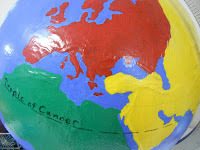 In Pope Francis we see a twofold and entirely consistent passion for evangelization and dialogue. Not only is there no contradiction between preaching the truth of Christ and walking with human persons in mutual understanding and love. They are in fact two facets of God's plan to pour out His love and mercy upon the world.
In Pope Francis we see a twofold and entirely consistent passion for evangelization and dialogue. Not only is there no contradiction between preaching the truth of Christ and walking with human persons in mutual understanding and love. They are in fact two facets of God's plan to pour out His love and mercy upon the world.It is the great gift that Jesus has given us in recreating the human race as God's family, wherein God is truly "our Father" and we are really brothers and sisters. This brother/sisterhood is something we know from the life of faith. It is established and vivified in a concrete and visible way through the sacrament of baptism. In baptism we are reborn; eternal life begins in us, and we are able to begin to live this life together in a way that the whole world can see through the great communio of the Church.
Moreover, belonging to Jesus opens our eyes to the fact that we are brothers and sisters of every human person, because every person has been created by our Father's love and has been truly redeemed by Jesus. In becoming human and dying on the Cross, He has embraced every human person right down to their very unique, personal, mysterious depths.
This means of course that we want the whole world to know Him. It also means that we have profound respect for every human person in the intimate dialogue between God's love and their freedom. We witness to Jesus with clarity, consistency, and without tiring; but not because we want to impose our particular culture or ideology on anyone. We witness because we know that He is the meaning and fulfillment of everything. But He does not "belong" to us, as though He were some pretext for our self-exaltation, superiority, and condescension toward others. He does not belong to us; we belong to Him. The fruits of our testimony are entrusted to the mysterious ways of the God who loves and shapes all hearts.
That is why proclaiming the truth of Christ's love for all peoples and for every human being also entails living as true brothers and sisters in this present moment with all those who have been given to us, wherever they come from. We don't need to put Christ and the Church aside to do this. On the contrary, we are called to live and extend faithfully this mystery of Christ's redeeming love wherever we go throughout the world. Thus we seek to live together with everyone in good will, to walk together, to help one another, to listen to and learn from one another about the mystery and struggles of our lives and the inexhaustible longing of our hearts. We live with and love one another always as brothers and sisters.
It is precisely Jesus Himself who makes this life possible. We place our trust in Him in front of every person. We bear witness to that trust by the grace of the Spirit, who inspires our manner of witness according to the steps that Jesus wills to take through us in order to make Himself known in the context of various circumstances and factors of life that are beyond our human knowledge. We bear witness to Him with words that foster understanding and express our own conviction, but always we must beg for the grace to allow His love to be present and to communicate itself through our lives.
And Jesus will give us the freedom to love persons in an exceptional way, and to appreciate the uniqueness of each and every one of them with profound tenderness. He will enable us to affirm with gratitude and to learn from all of the truth, goodness, and beauty that they possess from their religious and cultural heritages, and from their own experiences and understanding of life. He will give us a great compassion for their failures, and a humility about ourselves and the vocation that we all experience, which is to give ourselves in love, and to make room in our hearts so that we can let ourselves be loved.
We must neither impose our faith nor hide it for the sake of some imagined unity. Jesus Himself has established and is building up the unity of the human family, and He calls us in this present life -- in the face of so many obstacles -- to cultivate that unity in truth and love, trusting always in Him.
Published on June 10, 2013 20:00
June 8, 2013
Her Own Library Card!
There are many rites of passage in the life of a child. The library is one of the first social institutions to recognize a child's capacity to assume responsibility. But they use a lot of big words that are surely beyond the child's understanding. Little people make big commitments, and its a good thing that we are there to back them up.
"Look, Daddy, I got my own library card!"
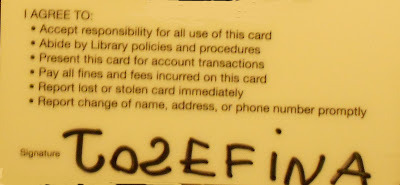 Josefina is all signed up! :)
Josefina is all signed up! :)
Thus another Janaro kid enters the System, and agrees to "accept responsibility...policies and procedures...transactions...and fees incurred...." Got all that, Josefina?

"Look, Daddy, I got my own library card!"
 Josefina is all signed up! :)
Josefina is all signed up! :)Thus another Janaro kid enters the System, and agrees to "accept responsibility...policies and procedures...transactions...and fees incurred...." Got all that, Josefina?

Published on June 08, 2013 20:26
June 7, 2013
Teach Me to Let Myself Be Loved By You
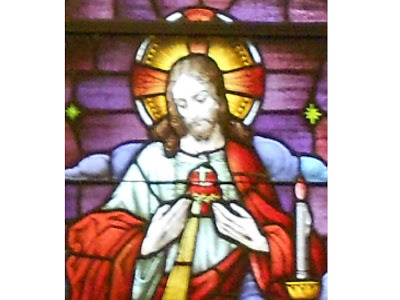
He comes close
and gives us His love with tenderness.Closeness and tenderness!The Lord loves us in these two ways,He draws near and gives all His loveeven in the smallest things:with tenderness.And this is a powerful love,because closeness and tendernessreveal the strength of God’s love.
It is more difficult to let God love us
than to love Him!The best way to love Him in returnis to open our hearts and let Him love us.Let Him draw close to usand feel Him close to us.This is really very difficult:letting ourselves be loved by Him.And that is perhaps what we need to asktoday in the Mass:
"Lord, I want to love You, but teach me the difficult science, the difficult habit of letting myself be loved by You, to feel You close and feel Your tenderness!"
May the Lord give us this grace.
Pope Francis,Homily for Feast of the Sacred Heart
Read selected quotations from the Pope's daily homilies at the Vatican Radio website.
Published on June 07, 2013 08:28
June 5, 2013
"Joining the Club" is Not Enough: I Want Brothers and Sisters

St. Benedict, patron of the Fraternity. This image
doesn't imply any endorsement by the Fraternity of
any of the nonsense in this blog post. The words here
are entirely due to the (lack of) responsibility of me.I mentioned last week that my wife and I were able to attend the annual retreat/Spiritual Exercises of the Fraternity of Communion and Liberation held for our region of the United States. It was really good for both of us on a lot of levels. We got to see many good friends that we don't see often, since no one from the Fraternity lives near us. We were also reminded of why we continue to be attached more deeply to the Church through this charism.
What I've written here are not polished reflections at all. This is rough stuff that is being left largely as I wrote it on first draft, before beginning to study the written texts from the Exercises, which is a work that we continue throughout the year. I still have much to discover and clarify (and reconsider) so as to express these points more precisely.
The grace of the charism of CL witnesses to a crucial aspect of what it means to live as members of one another in Christ, journeying together toward our common destiny of eternal life and love in the Trinity. Its so easy, as Catholics, to have a moment in which we recognize, "this is the road for our journey!" But then we walk that road like we are strangers to one another.
I have a very hard time with that. For me, the road is so weird and I get lost all the time, or go around in circles. I can't do this alone. I need something more than polite fellow-travelers on this trip.
I've studied "the road" for 30 years, and I've prayed, and this has been a good thing. But its like studying food and learning about cooking. The cookbooks tell me all about food and what to do with it, but they don't actually give me any food. And I'm hungry right now. Studying cooking just makes me more hungry. I want to eat... at least something.
Prayer of course nourishes, but it also mysteriously deepens the hunger. If my prayer is authentic, then it will lead me to discover ever more profoundly just how needy and poor I really am.
So where can I go? The Church ...what do I find in a parish? Activities and groups. That's okay, but its not enough. After its over, I get into my car and drive back to my lonely fortress. Is that what the New Testament calls "the fellowship of disciples"?
What about just giving up my mind and my freedom to some "Catholic dictator" who just tells me what to think and what to do and relieves me of the awful burden of being a human person? I must admit that this option can be very tempting. "Conformity" and "comfort," disguised as obedience, could shape my notions and my behavior into a formulaic routine, and give me a sense of superiority, but they would also also suffocate my heart -- that depth of me that says, "I am someone, I have been made for a reason, I have aspiration, I have hope, I don't just want to be reduced to a 'part' of a project, not even the cosmic project!"
What else is there for me? Can I exalt my aloneness and say, "I'm gonna do what I want and just blow off everybody else"? For me, personally, that's the short path to the psych ward. Others seem to get by with this attitude, except that its really crummy for their spouses (who often become ex-spouses) and their children and anyone else who needs them or tries to care about them.
I don't want to be alone. I need people. Clubs and the internet are not enough. Being part of the collective just covers up the loneliness. There's a lot missing even from the experience of being in dedicated Catholic groups that work together for the good of the Church. People can share an activity (even passionately) without sharing their lives. Passion for the cause can become a cover for not acknowledging the poverty of my person, for not sharing myself, for not loving and for not being honest about my own vulnerability, my own need to be loved.
I can even "belong" to a "movement," and wear it like a badge, and conform myself to its external style, and do all the "stuff," and still not invest myself. I can cover up the fact that I'm poor and that I need God. I can hide it from others, and from myself.
And I can write about this whole subject, but really be trying to avoid it. I'm saying, "See, I know about my need for Christian community, and I'm helping others to discover that too... so I 'get it,' obviously. That means that you, my friend, don't have bother me, okay? So go away!"
Its true that I don't want people meddling in my life. There is a reason for this fear. So often in life, my experience has been that people come along, stand on their platform, rebuke me, and then leave! That happens so much. It even happens in movements. It certainly happens in marriages. We live alone. Then we come out to "help" one another every so often. Then we go back to being alone.
I don't want to belong to a group of people who just correct my behavior and call me "brother," but don't actively love me. That's not the Church. That's manipulation. That's a fundamentalist sect. Its just another form of power imposing itself upon the weak.
When we talk about our relationship with in the Church, we use these terms: "brothers and sisters." Why? Are we just being nice? Why this metaphor, or even better, is it just a metaphor? The Church is our Mother. Baptism is a new birth. We are brothers and sisters and more, members of each other and members of Christ's body.
Is all this just "Christianspeak"? I hope not! Because this is what I want! I want brothers and sisters. I want a family. I want to belong to God, to call Him "Father," and to have the freedom to be with others in my life and say, "I am your brother" and "you are my brother, you are my sister, you help me just by the fact that we are together, you help me even when you fail or forget. We are together in Him. We help each other to follow Him to the place where our hearts will all finally be at home."
I run away from this myself, every day. It scares me to death (why is that?). But its still what I really want.
Published on June 05, 2013 20:06
June 3, 2013
"The Janaro Family" Turns Sixteen Years Old
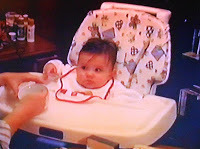 John Paul at maybe three or four months old.So do you have a little baby in the house? On June 1, 1997 we had our first little baby at three o'clock in the morning. I guess I'm supposed to say something like, "Gee, it feels like it just happened yesterday!"
John Paul at maybe three or four months old.So do you have a little baby in the house? On June 1, 1997 we had our first little baby at three o'clock in the morning. I guess I'm supposed to say something like, "Gee, it feels like it just happened yesterday!"Actually, no. It doesn't feel that way at all. It was, in fact, sixteen years ago. Since then, I've lived half my adult life (note, I said "adult" life, which was preceded by 18 years of "pre-adult" life... you don't need to do the math). Four daughters have come after him, and many things have happened since then.
Sometimes I'll come across a book and realize that its been 16 years since the last time I read it. That feels unusual. Light in August by William Faulkner... I just read that recently, didn't I? No, actually, I was reading it while we were waiting for John Paul to be born. That seems like "yesterday."
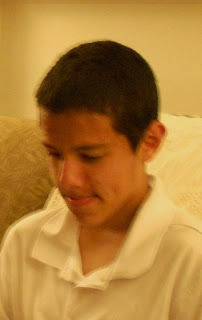 John Paul at the age of sixteen.But with my son there is a relationship. There has been a certain intersubjectivity* (n.b. *large philosophical word) between father and son, and with the other members of the family. It is the history of a relationship and a larger context of relationships that has grown and changed from year to year. My own childhood years seem very long in my memory. In a way, his years seem long too, at least when I think of the time in terms of our relationship and the subsequent development of our family up until the present.
John Paul at the age of sixteen.But with my son there is a relationship. There has been a certain intersubjectivity* (n.b. *large philosophical word) between father and son, and with the other members of the family. It is the history of a relationship and a larger context of relationships that has grown and changed from year to year. My own childhood years seem very long in my memory. In a way, his years seem long too, at least when I think of the time in terms of our relationship and the subsequent development of our family up until the present.John Paul was born like a little boxer, shaking his fists and wailing but also looking me straight in the eye with what appeared to be a sense of awareness and intelligence. Smart little feller.
He was the beginning of our family. He was the one who made me look at myself for the first time and say, "I'm a father." It put fear and trembling into me.
We're all growing together. At every point, I feel a more profound sense of helplessness: "How am I going to be a father to this (these) child (children)?" Somehow, Eileen and I have found the resources for every stage thus far. We are flawed parents raising flawed children, but we are also blessed and lifted up by grace and carried all along the way.
What does a father do? I don't have a clear "formula;" its a gift that keeps unveiling itself. A father loves his wife, and is grateful for her. He spends a lot of time on his knees begging God for help. He tries to teach and love and discipline with a trust in the grace of vocation and the providence that makes a family, as well as a healthy awareness of the "organic" reality that nurtures, in time, both interrelationships and the individual uniqueness of each person in a family. He never gives up on paternal tenderness, even when he fails every day. He prays together with the family. He prays alone, for the family. He prays and works with his wife, and trusts above all in the grace of Jesus present through the sacrament they share in marriage.
He is aware of the failures of his children, he is patient, he instructs, he corrects, but always he forgives. He does his best to be a man, but doesn't try to prove his manhood in some artificial way, and doesn't get insecure about his own weaknesses, because everyone is weak... (and fathers will be confronted with their human weaknesses in so many ways). He doesn't withdraw or hide. He just keeps getting up again, and keeps working on it.
Published on June 03, 2013 15:53
May 31, 2013
Change is Like Brain Surgery
Here comes the summer. I have a very hard time with changes in routine. I keep to my own routine as much as possible, but the rest of the household is shifting. School is over. The weather is flipping over into summer mode, hot and humid.
 The office actually just looks like any other officeThanks to the Montessori Center, I felt like I had something of a school year this past nine months. That was good, even if it was tiring.
The office actually just looks like any other officeThanks to the Montessori Center, I felt like I had something of a school year this past nine months. That was good, even if it was tiring.
Now the Center is moving, so I have to say goodbye to the office furniture (which is not ours) and hope that the new place has as good a chair for me. More changes.
For an obsessive person, change is like brain surgery. Okay, that's a bit strong. But changes in routine require some kind of neurological "rewiring" process, and they affect all of one's carefully constructed coping strategies. Focusing the mind on certain things (and taking it away from obsessive preoccupations) is a daily battle. Habits of thinking -- or rather, of processing one's environment -- are acquired, but changes require new adjustments or even starting from scratch.
I'm also trying to manage another physical downturn. Lately I've had some pain returning. My usually comfortable chair is sometimes uncomfortable now. I spend more time in bed during the day, often in the afternoon.
But these changes aren't so big.
John Paul turns 16 years old. He's probably going to work this summer. Work. A job.
Yeah, the kids are changing too. That's good. I have to rewire my brain for that, but I'll do it because they need me to function. I can't beat up on myself without hurting them, and I'm determined not to hurt them.
I'm determined to help them. I'm determined to live with changes.
 The office actually just looks like any other officeThanks to the Montessori Center, I felt like I had something of a school year this past nine months. That was good, even if it was tiring.
The office actually just looks like any other officeThanks to the Montessori Center, I felt like I had something of a school year this past nine months. That was good, even if it was tiring.Now the Center is moving, so I have to say goodbye to the office furniture (which is not ours) and hope that the new place has as good a chair for me. More changes.
For an obsessive person, change is like brain surgery. Okay, that's a bit strong. But changes in routine require some kind of neurological "rewiring" process, and they affect all of one's carefully constructed coping strategies. Focusing the mind on certain things (and taking it away from obsessive preoccupations) is a daily battle. Habits of thinking -- or rather, of processing one's environment -- are acquired, but changes require new adjustments or even starting from scratch.
I'm also trying to manage another physical downturn. Lately I've had some pain returning. My usually comfortable chair is sometimes uncomfortable now. I spend more time in bed during the day, often in the afternoon.
But these changes aren't so big.
John Paul turns 16 years old. He's probably going to work this summer. Work. A job.
Yeah, the kids are changing too. That's good. I have to rewire my brain for that, but I'll do it because they need me to function. I can't beat up on myself without hurting them, and I'm determined not to hurt them.
I'm determined to help them. I'm determined to live with changes.
Published on May 31, 2013 20:20



